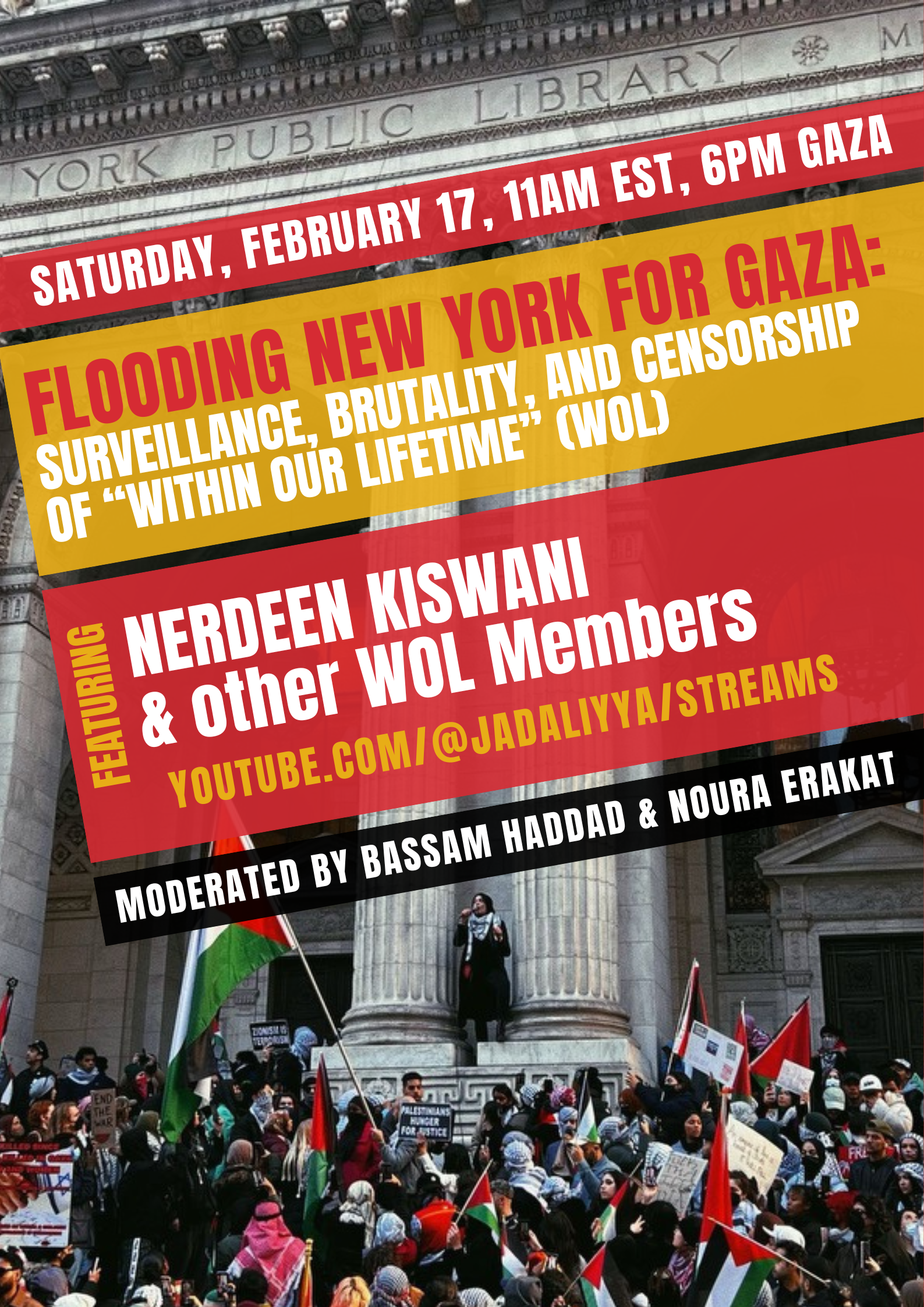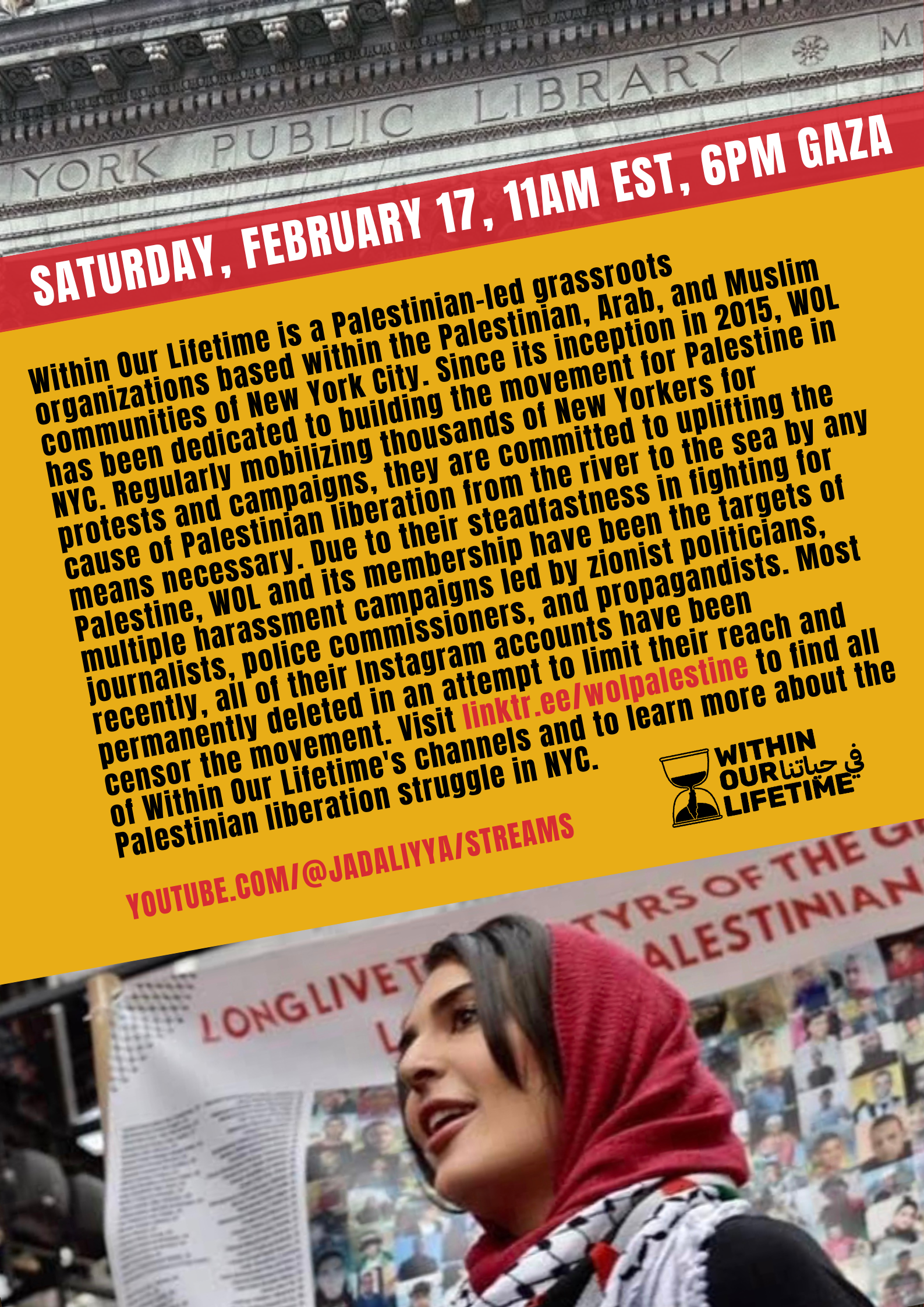Flooding New York for Palestine
Surveillance, Brutality and Censorship of "Within Our Lifetime"
Featuring:
Nerdeen Kiswani
& other WOL Members
Moderators:
Bassam Haddad
Noura Erakat
Read Within Our Lifetime's 80-page report on NYPD repression at
WOLPALESTINE.COM/RESISTREPRESSION
Organizers and protesters in New York have seen a new wave of government surveillance, brutality, and harrassment targeting their communities due to their steadfast solidarity with Palestinians. In this conversation, organizers from Within Our Lifetime will tell their story of four months of mass protest and their efforts to resist a coordinated repression campaign against the movement in New York City by the NYPD, big tech companies, universities, and right-wing journalists.


Featuring
Within Our Lifetime is a Palestinian-led grassroots organizations based within the Palestinian, Arab, and Muslim communities of New York City. Since its inception in 2015, WOL has been dedicated to building the movement for Palestine in NYC. Regularly mobilizing thousands of New Yorkers for protests and campaigns, they are committed to uplifting the cause of Palestinian liberation from the river to the sea by any means necessary. Due to their steadfastness in fighting for Palestine, WOL and its membership have been the targets of multiple harassment campaigns led by zionist politicians, journalists, police commissioners, and propagandists. Most recently, all of their Instagram accounts have been permanently deleted in an attempt to limit their reach and censor the movement. Visit linktr.ee/wolpalestine to find all of Within Our Lifetime's channels and to learn more about the Palestinian liberation struggle in NYC.
Nerdeen Kiswani is a Palestinian organizer from New York City. She is the founder and chair of Within Our Lifetime - United for Palestine, a community organization revitalizing the revolutionary spirit of the Palestinians in exile in pursuit of liberation. Nerdeen has spoken for the Palestinian cause at events and conferences worldwide and has organized rallies with tens of thousands of attendees in support of Palestine. Nerdeen graduated from the CUNY school of Law and has organized successful campaigns on and off campus to pass a resolution by the student government and faculty of CUNY Law to cut all ties and divest from all israeli institutions that service the occupation. The resolution also defends the right for Palestinians to resist colonization and calls to protect Palestinian speech. In 2021 Nerdeen led a campaign that successfully defeated a proposal to adopt the IHRA definition of antisemitism which it equates with antizionism. While her organizing led to Zionist organizations orchestrating character assassination campaigns against Nerdeen demanding she is expelled, in the summer of 2021 CUNY Law issued a statement defending Palestinian activism and denouncing anti-palestinian hate.Not only was this the first statement of its kind from a U.S. law school, contrary to the zionist demands to discipline Nerdeen, she was chosen to be the commencement speaker at the 2022 CUNY Law graduation, marking another victory for those fighting for Palestine and our refusal to be silenced.
Daniel C. is a longtime member of Within Our Lifetime and a graduate of the CUNY system. He is currently working as an attorney defending tenants from evictions in Queens County.
Bassam Haddad (Moderator) is Founding Director of the Middle East and Islamic Studies Program and Associate Professor at the Schar School of Policy and Government at George Mason University. He is the author of Business Networks in Syria: The Political Economy of Authoritarian Resilience (Stanford University Press, 2011) and co-editor of A Critical Political Economy of the Middle East (Stanford University Press, 2021). Bassam is Co-Founder/Editor of Jadaliyya Ezine and Executive Director of the Arab Studies Institute. He serves as Founding Editor of the Arab Studies Journal and the Knowledge Production Project. He is co-producer/director of the award-winning documentary film, About Baghdad, and director of the acclaimed series Arabs and Terrorism. Bassam serves on the Board of the Arab Council for the Social Sciences and is Executive Producer of Status Audio Magazine and Director of the Middle East Studies Pedagogy Initiative (MESPI). He received MESA's Jere L. Bacharach Service Award in 2017 for his service to the profession. Currently, Bassam is working on his second Syria book titled Understanding the Syrian Calamity: Regime, Opposition, Outsiders (forthcoming, Stanford University Press).
Noura Erakat (Moderator) is a human rights attorney and an Assistant Professor at Rutgers University, New Brunswick Department of Africana Studies. Her research interests include humanitarian law, refugee law, national security law, and critical race theory. Noura is the author of Justice for Some: Law As Politics in the Question of Palestine (Stanford University Press, 2019). She is a Co-Founding Editor of Jadaliyya e-zine and an Editorial Committee member of the Journal of Palestine Studies. She has served as Legal Counsel for a Congressional Subcommittee in the House of Representatives, as a Legal Advocate for the Badil Center for Palestinian Refugee and Residency Rights, and as the national grassroots organizer and legal advocate at the US Campaign to End the Israeli Occupation. Noura is the coeditor of Aborted State? The UN Initiative and New Palestinian Junctures, an anthology related to the 2011 and 2012 Palestine bids for statehood at the UN. More recently, Noura released a pedagogical project on the Gaza Strip and Palestine, which includes a short multimedia documentary, "Gaza In Context," that rehabilitates Israel’s wars on Gaza within a settler-colonial framework. She is also the producer of the short video, "Black Palestinian Solidarity." She is a frequent commentator, with recent appearances on CBS News, CNN, Fox News, and NPR, among others, and her writings have been widely published in the national media and academic journals.